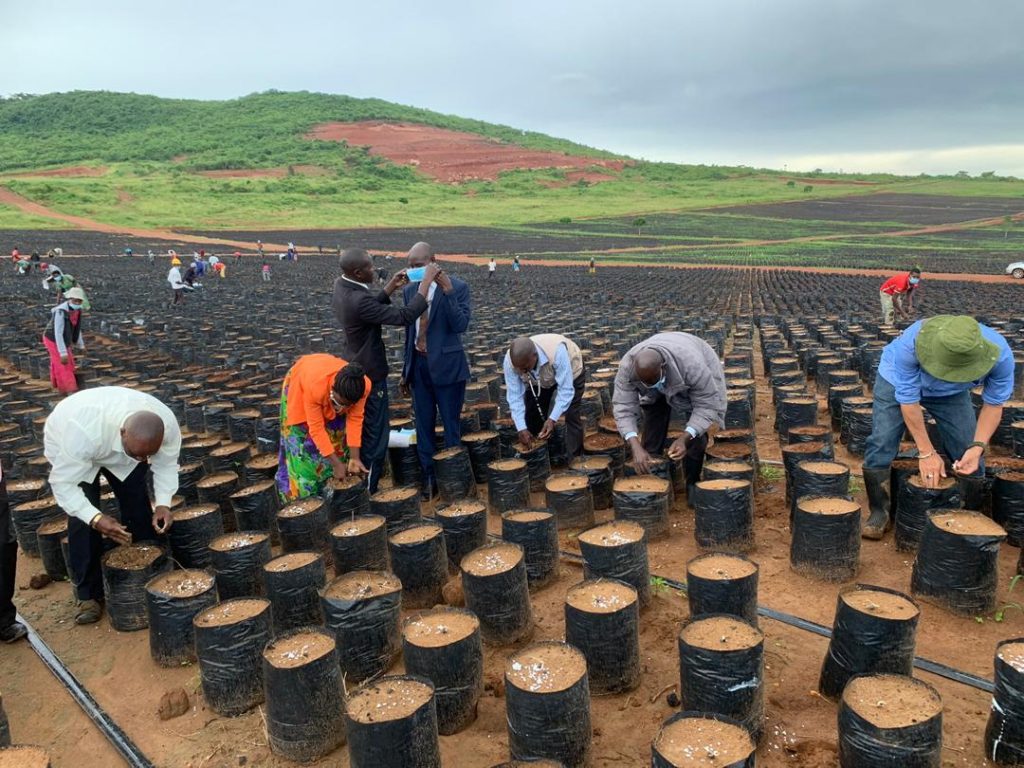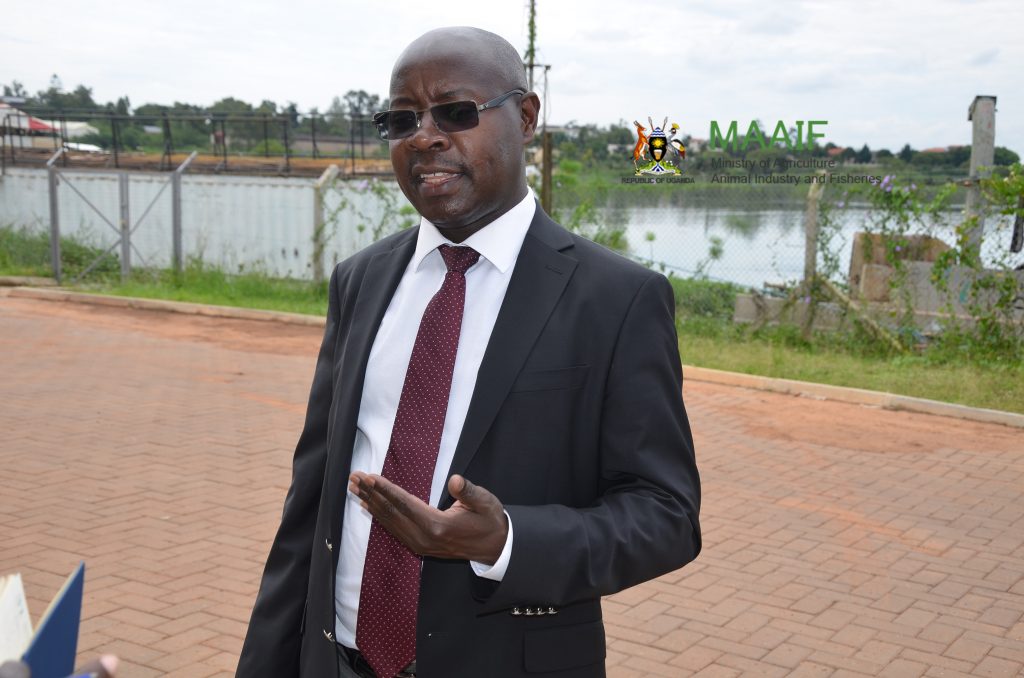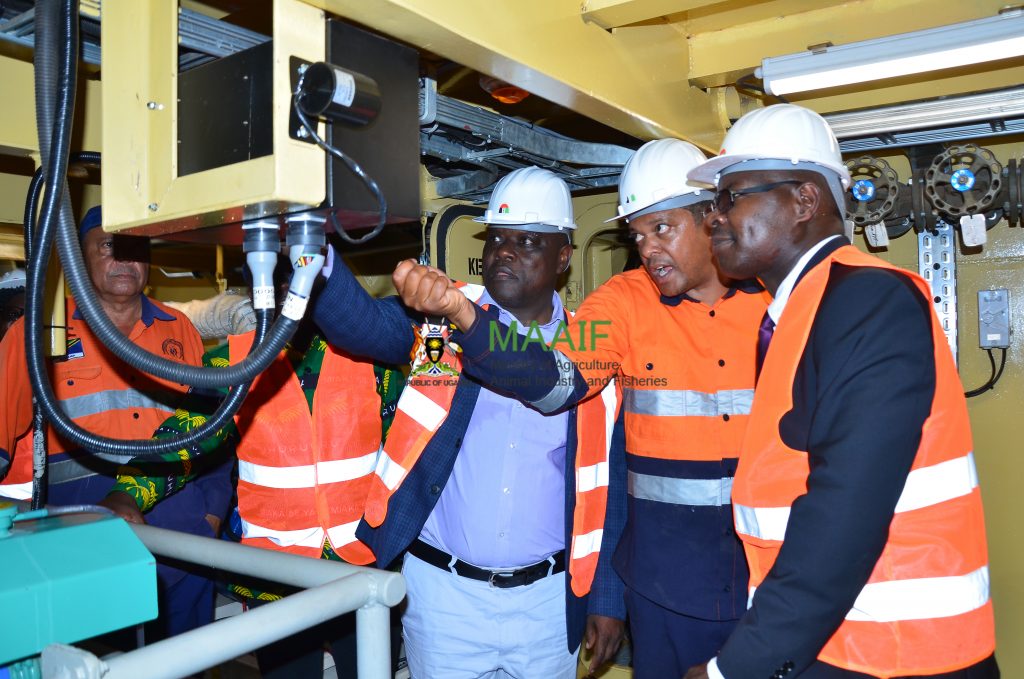
Farmers in Buvuma receive seedlings as per project schedule despite COVID Crisis
Buvuma, 17th April 2020. It is a new dawn for farmers signed up for the National Oil Palm Project of the Ministry of Agriculture, Animal Industry and Fisheries with support from the International Fund for Agricultural Development.
Buvuma received the first batch of 190,000 of pre-geminated oil palm seedlings on 16th April 2020 and planted in the nursery. This is as per the planting schedule. The farmers are targeted to plant 500 hectares and this will require about 75,000seedlings.The seedlings will stay in the nursery for 14 months before are given to farmers for planting in their fields.
The seedlings which were delivered by Mr. Chin Tek the Manager for Oil Palm Buvuma Limited, the Company incorporated by Bidco Uganda Limited to implement Oil Palm development activities in Buvuma, were received by Ms. Agnes Nabirye the Resident District Commissioner in the presence of the Deputy RDC Mr. Kigongo Juma, Mr. Alex Mabirizi the LC5 Chairperson, Mr. Kasekende Gonzanga the District Secretary for Production and Mr. Charles Aisu the LC3 Chairperson of Busamuzi Sub- County and other local leaders.The Project Coordination team was represented by Mr.Gerald Epai the Project Liaison Officer.

Higher Productivity, More incomes
According to the Project Manager Ms. Connie Masaba, the 190,000 seedlings that the pregerminated seedlings are of a high-yielding hybrid which are fusarium resistant, gernoderma tolerant and drought tolerant. Supplied by Palmelit breeders.
Replicating the successful 4P Model
As highlighted by the Ministry Permanent Secretary Mr. Pius Wakabi Kasajja, the 4P Model is the Public Private Producer Partnership model which the Ministry implemented through the National Oil Palm Project through which Oil Palm farmers are mobilised and facilitated in a number of ways.

As highlighted by the Permanent Secretary, the 4P model of the Ministry focuses on:
- Production and productivity of a common crop
- Linkage to the processor for skill transfer and expertise
- Marketing and post-harvest handling
- Participatory price setting and control and
- promotes an inclusive business model in which the smallholder farmers co invest with a highly skilled private sector in a facilitated shareholding, risk and voice mechanism. The intention is to enable the smallholder farmers to learn from the experienced private sector the expertise much required in the unique oil palm enterprise.
Dividends Earned
The organised Oil Palm Growers who are mainly smallholder farmers in Kalangala entered into the year 2020 with a commendable 10 Billion shillings from their 10% shareholding in Oil Palm Uganda Limited.
New initiatives for improving market linkages
Construction of new state-of-the-art ferry for Buvuma kick-started in Mwanza, Tanzania.
The keel laying ceremony (equivalent of groundbreaking for buildings) was undertaken by Hon. Henry Aggrey Bagiire the Minister of State for Agriculture who was accompanied by Mr. Pius Wakabi Kasajja the Permanent Secretary and Ms. Connie Magomu Masaba the Project Manager for the Vegetable Oil Development Project which is transitioning into the National Oil Palm Development Project.

The introduction of this additional ferry is important and is part of the efforts of government in improving transport to support the oil palm growing areas of Buvuma Island via the Kiyindi – Kirongo Buvuma route.
The works commenced on 24th June 2019 with design of the ferry and should be completed by December 2020.
Notes for editors
About the Ministry of Agriculture, Animal Industry and Fisheries (MAAIF)
The Ministry of Agriculture, Animal Industry and Fisheries is a Ministry in the Government of Uganda charged with creating an enabling environment in the Agricultural Sector.
The Ministry formulates, reviews and implement national policies, plans, strategies, regulations and standards and enforce laws, regulations and standards along the value chain of crops, livestock and fisheries.
Vision: A competitive, profitable and sustainable agricultural sector.
Mission: To transform subsistence farming to commercial agriculture.
Strategic Objectives
- To initiate the formulation and review of the policy and legal framework for the sector
- To establish and implement systems for service provision in the sector
- To strengthen and implement strategies, regulatory framework, standards, institutional structures and infrastructure for quality assurance and increased quantities of agricultural products to access and sustain local, regional and export markets
- To design and implement sustainable capacity building programmes for stakeholders in the agricultural sector through training, re-tooling, infrastructure, provision of logistics and ICT
- To develop strategies for sustainable food security
- To develop appropriate agricultural technologies for improved agricultural production, productivity and value addition through research
- To develop effective collaborative mechanisms with affiliated institutions and
- To take lead and establish a system and institutional framework for agricultural data collection, analyses, storage and dissemination to stakeholders including Uganda Bureau of Statistics.
The Ministry of Agriculture, Animal Industry and Fisheries (MAAIF) is made up of four Directorates including the Directorate of Crop Resources, Directorate of Animal Resources, Directorate of Agricultural Extension Services and the Directorate of Fisheries Resources each with Departments, Divisions and Partnership Projects.
The Departments of the Ministry which do not fall directly in the above include the Department of Agricultural Planning and Development, the Human Resource Department, the Department of Finance and Administration and the Department of Agricultural Infrastructure, Mechanisation and Water for Agricultural Production.
The Ministry is also made up of seven Agencies including the National Agricultural Research Organisation (NARO), the National Agricultural Advisory Services (NAADS), Cotton Development Organisation (CDO), Dairy Development Authority (DDA), Uganda Coffee Development Authority (UCDA) and Coordinating Office for the Control of Trypanosomiasis in Uganda (COCTU) and the National Animal Genetic Resources Centre and Databank (NAGRC&DB).
